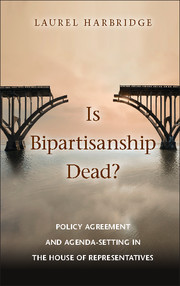Book contents
- Frontmatter
- Contents
- List of figures and tables
- Acknowledgments
- 1 Introduction
- 2 A Puzzle of Declining Bipartisanship
- 3 Strategic Partisan Agenda-Setting
- 4 Agenda-Setting and the Decline of Bipartisan Cooperation
- 5 Variation in Strategic Partisan Agenda-Setting
- 6 Strategic Partisan Agenda-Setting Across Policy Areas
- 7 District Responsiveness and Member-Party Relationships
- 8 The Past, Present, and Future of Bipartisanship
- Appendix
- References
- Index
8 - The Past, Present, and Future of Bipartisanship
Published online by Cambridge University Press: 05 March 2015
- Frontmatter
- Contents
- List of figures and tables
- Acknowledgments
- 1 Introduction
- 2 A Puzzle of Declining Bipartisanship
- 3 Strategic Partisan Agenda-Setting
- 4 Agenda-Setting and the Decline of Bipartisan Cooperation
- 5 Variation in Strategic Partisan Agenda-Setting
- 6 Strategic Partisan Agenda-Setting Across Policy Areas
- 7 District Responsiveness and Member-Party Relationships
- 8 The Past, Present, and Future of Bipartisanship
- Appendix
- References
- Index
Summary
The extent to which political conflict falls along party lines has waxed and waned over the years. Studies of roll call voting patterns in Congress indicate that partisan conflict has risen steadily over the last several decades (e.g., McCarty et al. 2006; Theriault 2008). Despite a previous generation of scholars’ claims that strong, conflictual parties were a desirable part of a functioning democracy (APSA 1950; Schattschneider 1942), recent assessments of partisan conflict have been far from positive. Rather, the resurgence of partisan conflict raises concerns about the legislative process itself, as well as concerns with representation, suggesting that elected officials are increasingly partisan and unresponsive to the public (Hacker and Pierson 2005; Mann and Ornstein 2006, 2012).
As Congress has shifted toward greater partisan conflict, political scientists have studied many facets of rising polarization. However, few scholars have sought to systematically separate substantive disagreement between members of opposing parties, agenda control, and voting patterns. Much of the research on polarization has focused on estimates of members’ ideological positions based on their roll call voting; this work shows a linear increase in polarization since the early 1970s (McCarty et al. 2006; Poole and Rosenthal 1984, 1997; Theriault 2008). Although many scholars assume that this increase reflects growing ideological differences, Lee’s (2009) research on Senate partisanship suggests that not all partisan conflict is ideological. And while many scholars have emphasized the importance of agenda-setting in the House (e.g., Aldrich 1995; Cox and McCubbins 2005; Lawrence et al. 2006; Lebo et al. 2007; Rohde 1991), little research has systematically examined the selection of legislation for the agenda or how the content of the agenda has changed over time (for an exception, see Roberts and Smith 2003). As a consequence, existing work examining partisan conflict remains incomplete because it has focused either on the polarization of member preferences or on party influence over time, but not on the connection between party control over the agenda, the roll call votes of members, and resulting level of partisan conflict. In many ways, the near-exclusive focus on roll call votes has limited the resulting insights about the extent of partisan conflict versus bipartisan agreement.
- Type
- Chapter
- Information
- Is Bipartisanship Dead?Policy Agreement and Agenda-Setting in the House of Representatives, pp. 169 - 190Publisher: Cambridge University PressPrint publication year: 2015



